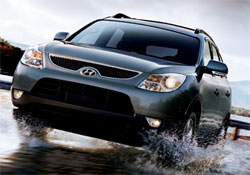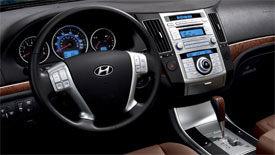2007 Hyundai Veracruz
From poor quality Korean-made imports just over two decades ago, to American-made sedans and utilities that rival Toyota-quality today, Hyundai’s rise has been historic. And they’re not finished. Hyundai now has the prestige of Lexus in their sights. Last year they launched the Azera sedan with that in mind, and this year it’s the posh Veracruz Crossover Utility. But, the question remains, will upscale buyers ever be impressed by a Hyundai?
The gap in quality, luxury, features, and performance, between status symbol marques, and more modest consumer brands, is undeniably shrinking. And, Korea’s Hyundai is bent on making it happen even faster. Indeed, their just-introduced, mid-size 2007 Hyundai Veracruz Crossover Utility makes this very point.
Park a Lexus RX 350 in the adjacent parking slot, and you’ll quickly see where the Veracruz gets its inspiration. It emulates the fine lines of the Lexus almost to a tee. But with room for seven, and an overall length of 190.6 inches, it is visibly larger than the five-passenger RX.
Up front you’ll find three-tiered headlights stacked above projector-type fog lamps. The bumper is well-sculpted and the dual-bezel grille dons the flying-H logo where you might expect to find Lexus’ encircled “L.”
A seamless back-end features wedgy taillights, as well as a spoiler and dual chrome exhaust tips. Our Limited tester also sports a standard power lift-gate.
 The Limited’s soft leather seating surfaces, with front heat, are a testament to this fact. GLS, SE, and Limited are all well equipped. The Ultimate Package adds memory, power adjustable pedals, a power tilt and telescoping wheel, 115-volt outlet, and rear-seat DVD. Optional too is a 605-watt 10-speaker Infinity audio system.
The Limited’s soft leather seating surfaces, with front heat, are a testament to this fact. GLS, SE, and Limited are all well equipped. The Ultimate Package adds memory, power adjustable pedals, a power tilt and telescoping wheel, 115-volt outlet, and rear-seat DVD. Optional too is a 605-watt 10-speaker Infinity audio system.
For safety, there are six standard airbags with roll-sensing side curtains that extend to all three rows.
The 60/40 split, sliding second-row bench-seat offers ample legroom and its own climate controls. There is reasonably easy access to the standard “hideaway” third-row 50/50 seat that’s suitable for children or small adults.
Cargo room is voluminous with 86.8 cubic feet with second row and third row folded down. For long loads the front passenger seat drops as well - a convenient feature Lexus should adopt.
On the pavement, the Veracruz performs like a premium vehicle. Push the keyless start button to awaken its 3.8-liter double overhead cam V-6 engine, borrowed from Hyundai’s flagship Azera sedan. This power plant outputs 260 horsepower - just 10 less than the RX 350 - and 257 pound-feet of torque.
Utilizing Hyundai’s first 6-speed automatic transmission with Shiftronic manual mode, momentum feeds smoothly to either front or to all-wheel drive with a 50/50 lock mode.
 On the track, our cushy-UTE rushed from 0 to 60 in an impressive 7 seconds flat, although it felt more genteel than the numbers suggest. The quarter-mile passed in 15.2 seconds at 100 miles-per-hour. But with such prowess comes lackluster efficiency. Government Fuel Economy ratings are 16 city/23 highway on regular Gas. Our four-wheel-drive tester achieved only 16.7 miles-per-gallon. The Veracruz has a fairly high Energy Impact Score too of 19.1 barrels of oil consumed per year.
On the track, our cushy-UTE rushed from 0 to 60 in an impressive 7 seconds flat, although it felt more genteel than the numbers suggest. The quarter-mile passed in 15.2 seconds at 100 miles-per-hour. But with such prowess comes lackluster efficiency. Government Fuel Economy ratings are 16 city/23 highway on regular Gas. Our four-wheel-drive tester achieved only 16.7 miles-per-gallon. The Veracruz has a fairly high Energy Impact Score too of 19.1 barrels of oil consumed per year.
The stiff, Santa Fe-based unitized chassis provides a soft and quiet ride. Except over sharp bumps, it’s comparable to the RX.
On the track, that softness of the all-independent suspension still grants better than expected balance but with plenty of lean. Though there is some over steer, it’s easily combated with standard Electronic Stability Control.
Braking hardware is par for its class, 4-wheel discs with ABS and Brake Assist. While panic stops from 60 were stable, and the pedal firm, a 140 foot average is too long.
Base pricing for the Veracruz GLS begins at a rock bottom $26,995, while a better outfitted SE starts at $28,695, and our Limited starts at $32,995. That’s roughly $5,000 less than a comparably equipped RX 350. And Hyundai, of course, has one of the best warranties in the business.
Our conclusion is what you might expect. The Veracruz Crossover Utility is very impressive. Yet, with the Hyundai name, it doesn’t have the posh reputation that will persuade buyers to stop shopping Lexus. Still, if you’re thinking Honda Pilot, or Toyota Highlander, the Veracruz is a great alternative that’s also a step up.
Specifications
- Engine: 3.8-Liter Double Overhead Cam V-6
- Horsepower: 260
- Torque: 257 Lb Feet
- 0-60 MPH: 7.0 Seconds
- 1/4 Mile: 15.2 Seconds @ 100 MPH
- 60-0 MPH: 140 Feet
- EPA: 16 MPG City/ 23 MPG Highway
- Mixed Loop: 16.7 MPG
- Energy Impact Score: 19.1 Barrels Of Oil






